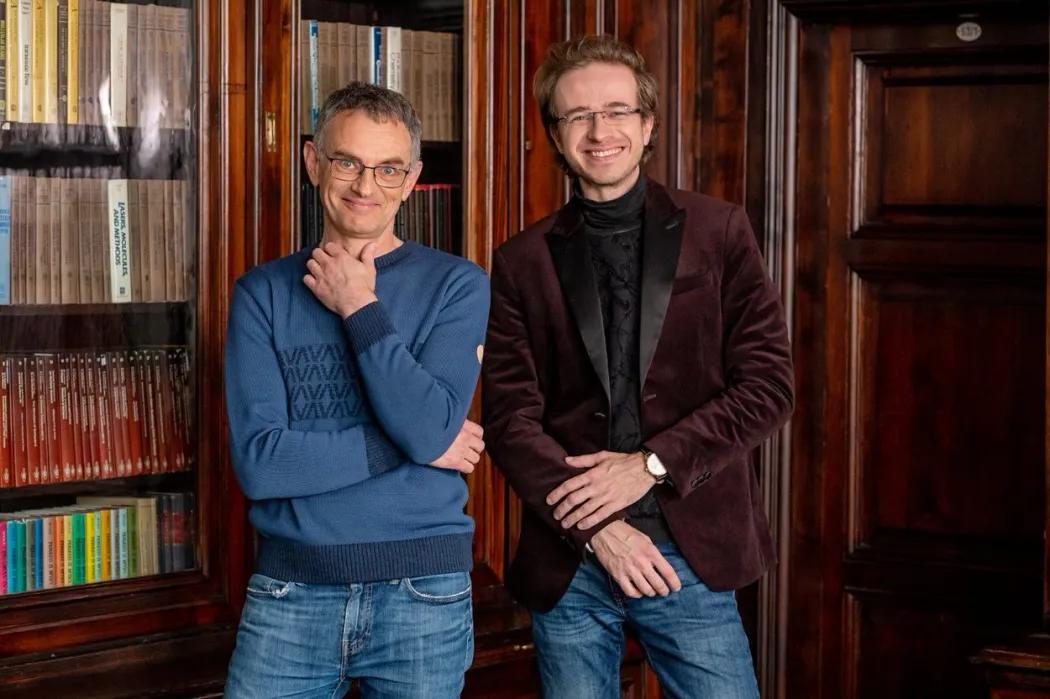Libor Šmejkal from the Institute of Physics of the Czech Academy of Sciences has won the second place in the “Best Dissertation Thesis” category in this year’s Werner von Siemens Award. Libor won the award for the thesis entitled “Topology band theory of relativistic spintronics in antiferromagnets” supervised by professor Tomáš Jungwirth.
Ferromagnetism with low-loss electrons occurs in nature only at very low temperatures, close to absolute zero, like superconductivity. The research performed by Libor Šmejkal demonstrates not only the fact that antiferromagnetism is compatible with low-loss electrons at much higher temperatures but also that it typically shows much richer, quantum mechanical movement of electrons, which will find application in technical components in the near future.
The results of the research can be used in detailed mapping of antiferromagnetic crystals and can be translated into practice in future applications such as computer memories, transistors or even neuromorphic computers. “Neuromorphic computer architectures resemble our brains, but although they are intensively researched in theory, their practical use lacks suitable candidate materials. Therefore, multiple-state antiferromagnets seem to be natural candidates,” Libor Šmejkal explained.
Low-loss electron antiferromagnets might also be very attractive for nanoelectronic applications - they might be used, for example, as a new form of the transistor. The potential of antiferromagnets to significantly reduce electricity consumption might contribute to solving the current energy issues. Antiferromagnets might also extend the nominal range of electric cars from hundreds to thousands of kilometres or extend the lifespan of batteries in smart electronics from days to months.
Discovering as yet unobserved states of matter in nature might also have a significant impact on other scientific disciplines. It seems, for example, that the theory that was originally helping to improve the signal/noise resistance of a component can also be helpful when detecting dark matter.
The plans involve a material for the detection of dark matter
As a follow up to his dissertation thesis, Libor Šmejkal is working together with his colleagues on another research focused on developing a new generation of low-loss currents in manganese silicon alloy antiferromagnets and, in cooperation with particle physicists, is trying to propose a material for the detection of dark matter.
I consider this victory to be the recognition of our entire discipline and of the people who have influenced our work, so I am going to make use of the award for the benefit of our community.
“In terms of my research efforts, I’d like to develop our understanding of macroscopic quantum dissipation-free currents. In terms of technology, I’d like to contribute to the identification and the manufacture of materials that will allow us to apply our phenomena to technical components, and, one day perhaps also to commercial technologies,” Libor Šmejkal revealed his research plans.
Today, Libor Šmejkal is already an internationally recognized expert but who was his role model or influencer at the onset of his successful research career? “First of all it was Tomáš Jungwirth, who developed the opportunities for close interplay between experimental and theoretical research in spintronics in the Czech Republic to a word-class level, and with whom I experienced a lot of exciting discoveries. I was lucky enough to work together with leading physicists from around the world such as Jair Sinova and Allan MacDonald,“ Libor said. “As for global personalities, I got very inspired by the lives of Richard Feynman, Steve Jobs or Elon Musk. Finally, I am very grateful to my friends, my family and my sister, I’d never be able to make the discoveries without them,” he added.
Recognition of the entire discipline of spintronics
The Werner von Siemens Award is the first competition to which Libor Šmejkal decided to submit his dissertation thesis. “I liked the format of the competition for three reasons. First: the competition is open to all disciplines, not only to physics. Second: the competition is organised under the auspices of a technological company that has followed the legacy of an important inventor and electrical engineer of the 19th century for 173 years. Third: I appreciate the fact that the award goes to both the author and his/her supervisor,“ Libor said to explain the reasons behind his decision to participate in the competition.
And how will he use the money associated with the award? “For further professional development. I consider this victory to be the recognition of our entire discipline and of the people who have influenced our work, so I am going to make use of the award for the benefit of our community,“ Libor Šmejkal concluded.
Text: Siemens, s.r.o., Communications

